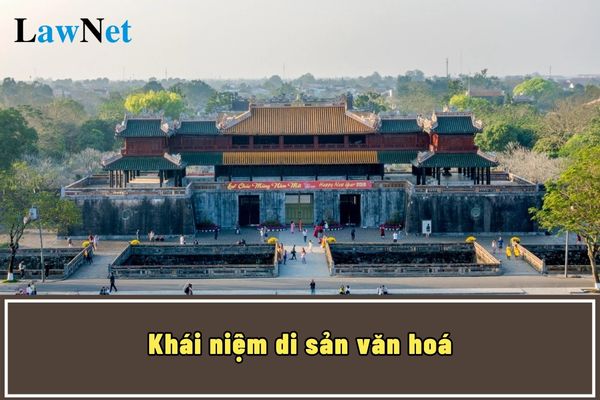What is the concept of cultural heritage? In Vietnam, what is the subject whose curriculum includes the concept of cultural heritage?
What is the concept of cultural heritage in Vietnam?
According to Article 1 of the Law on Cultural Heritage 2001:
- Cultural heritage provided for in this Law includes intangible and tangible cultural heritages, which are spiritual and material products having historical, cultural or scientific value and handed down from generation to generation in the Socialist Republic of Vietnam.
Additionally, in Clauses 1 and 2, Article 4 of the Law on Cultural Heritage 2001, amended by Clause 1, Article 1 of the Law on Amendments to the Cultural Heritage Law 2009, the concepts of Intangible Cultural Heritage and Tangible Cultural Heritage are defined as follows:
- Intangible cultural heritage means spiritual products associated with related communities, individuals, objects and cultural spaces, which are of historical, cultural or scientific value, express the identity of communities, are constantly recreated and transmitted from generation to generation orally, through craft teaching, performing arts or in other forms.
- Tangible cultural heritages are material products of historical, cultural or scientific value, including historical-cultural relics, famous landscapes and beauty spots, vestiges, antiques and national precious objects.
| *In common understanding: Cultural heritage comprises both intangible and tangible assets inherited from previous generations, heavily marked by a nation, region, or community's essence. These are spiritual and material values significant for the past, present, and future of humanity. Types of Cultural Heritage Cultural heritage is classified into various types based on characteristics and forms of expression: Intangible Cultural Heritage: Includes social customs, rituals, performing arts, oral knowledge, language, and traditional craftsmanship skills. Examples: ca tru, hat xam, traditional festivals, ethnic costumes, cuisine,... Tangible Cultural Heritage: Includes architectural works, sculptures, paintings, archaeological objects, collections,... Examples: the ancient capital Hue, temples, communal houses, ancient household items,... Significance of Cultural Heritage Historical value: Cultural heritage is vivid evidence of the history and culture of a nation. Cultural value: Cultural heritage reflects a community's cultural identity, creating differences and uniqueness. Educational value: Cultural heritage is a valuable resource for study, learning, and education. Economic value: Cultural heritage can become a tourist asset, contributing to economic development. |
*Note: Information is for reference only./.

What is the concept of cultural heritage? In Vietnam, what is the subject whose curriculum includes the concept of cultural heritage? (Image from the Internet)
In Vietnam, what is the subject whose curriculum includes the concept of cultural heritage?
Under Section 5 of the General Education Program in History issued with Circular 32/2018/TT-BGDDT:
Topic 10.2: CONSERVATION AND DEVELOPMENT OF CULTURAL HERITAGE VALUES IN VIETNAM
Cultural Heritage
Concept of Cultural Heritage
- Concept of Cultural Heritage
- Significance of Cultural Heritage
Categorization of Cultural Heritage and Ranking of Historical-Cultural Monuments
- Categorization of Cultural Heritage
- Ranking of Cultural Heritage
Conservation and Enhancement of Cultural Heritage Values
Relationship between Conservation and Development
- Concept of Cultural Heritage Conservation
- Relationship between Conservation and Enhancement of Cultural Heritage Values
Solutions for Conservation and Enhancement of Values
- Scientific basis of conservation work, enhancing the value of cultural heritage
- Solutions for conservation and enhancement of cultural heritage values
Roles and Responsibilities of Involved Parties
- Role of political systems, businesses, local communities, and every individual in conservation and enhancement of cultural heritage values.
- Responsibilities of involved parties: State, social organizations, schools, community, citizens in conserving and enhancing cultural heritage values
Some outstanding cultural heritage of Vietnam (suggestions)
Introduce some notable intangible cultural heritages
- Bac Ninh's Quan Ho traditional singing
- Ceremonial singing
- Cultural space of gong in Central Highlands of Vietnam
- Huế Royal Court Music
- Southern amateur music
- ...
Introduce some notable tangible cultural heritages
- Dong Son Bronze Drum
- Co Loa Citadel
- Thang Long Imperial Citadel
- Temple of Literature - Imperial Academy (Hanoi)
- Ba Dinh Square and the Historical Site of President Ho Chi Minh Memorial Site
- Ho Dynasty Citadel
- Hue Imperial Citadel
- Cham Towers
- ...
Introduce some notable natural heritages
- Geological Parks: Dong Van Karst Plateau, Non Nuoc Cao Bang
- Ha Long Bay
- Cuc Phuong National Park
- Cat Tien National Park
- ...
Thus, students will learn the concept of cultural heritage in the 10th-grade History curriculum as part of the academic topic.
What are the regulations on assessment of the educational results for grade 10th-grade History in Vietnam?
Under Section 7 of the General Education Program in History issued with Circular 32/2018/TT-BGDDT:
VII. ASSESSMENT OF EDUCATIONAL OUTCOME
The purpose of assessing historical education outcomes is to determine the degree of student compliance with required knowledge and competencies in history for each topic and grade, to adjust teaching and learning activities to achieve program objectives. The assessment activities must encourage students' passion for learning, exploring, and discovering historical issues, helping them gain confidence and creativity in studying.
Assessment content should focus on the ability to creatively apply learned historical knowledge in specific situations, not emphasizing rote memorization and recall of historical knowledge.
Through assessment, teachers can grasp learning conditions, and the level of differentiation in students' academic performance in the class, to help those who have not met the required knowledge and competencies, identify and foster students with exceptional history talent, and simultaneously adjust and improve teaching methods in history education.
In terms of assessment form, it is necessary to combine continuous assessment and periodic assessment, combining teacher assessment and self-assessment by students; combine oral, written, practical tests, and research projects; combine objective testing and essays.

